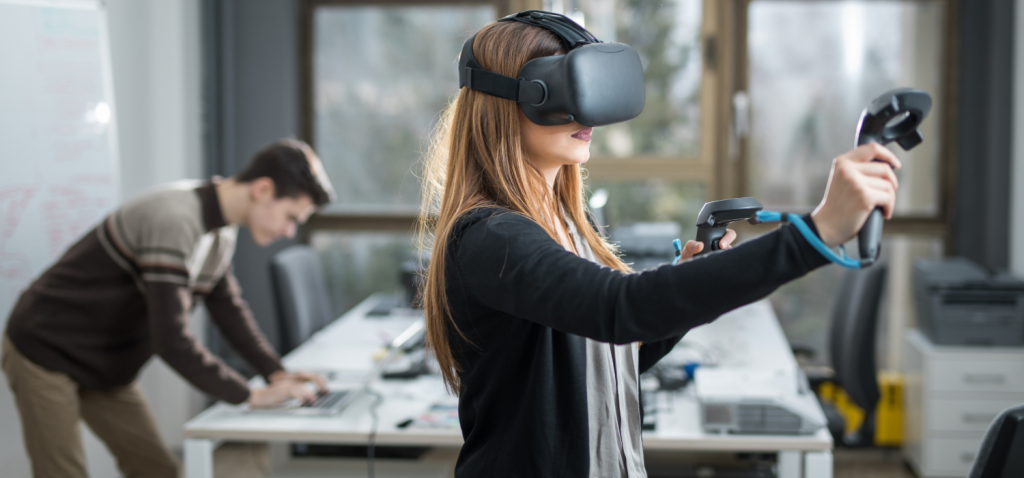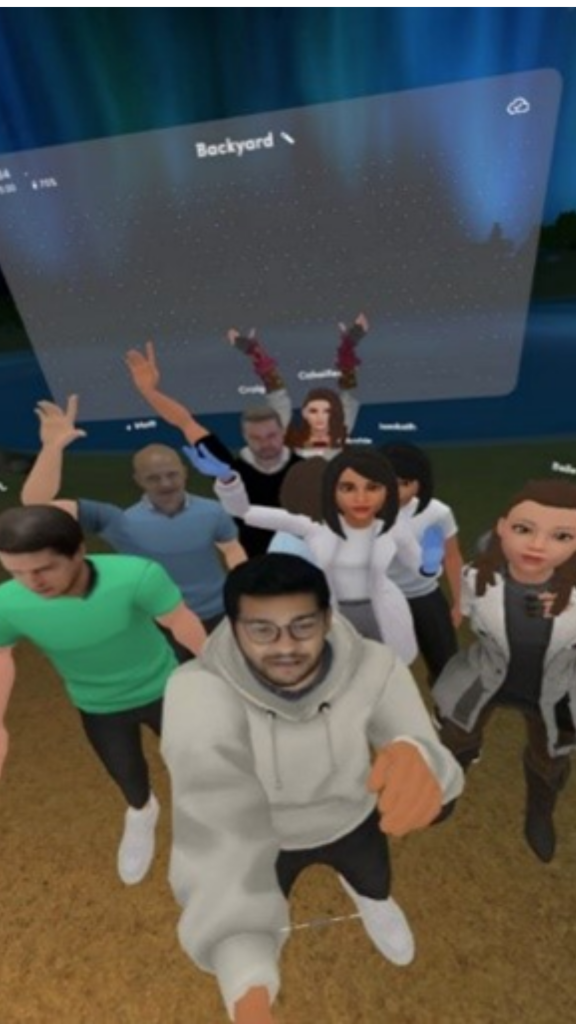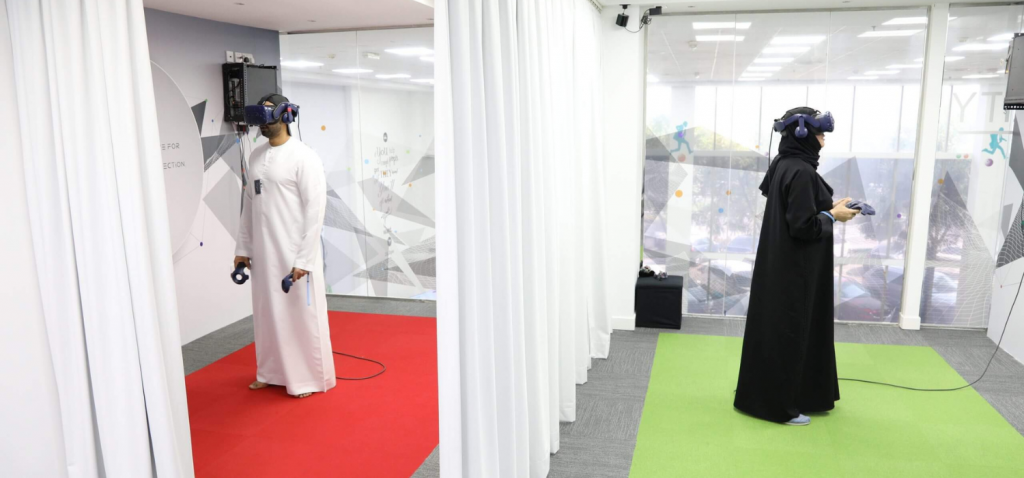The Metaverse conjures up a wide variety of responses. From it’s the next wave of digital change and unstoppable, to it’s a waste of time and will never stick. But if I’m honest, the great majority of people just give me blank stares when I’ve attempted to talk about it. As my nickname at Biz Group is ‘What’s Next’, I decided to do some holiday reading to help demystify the enigma that the Metaverse seems to be and share how I think it will impact both the world of learning and the world of work.
Interestingly, all the big consulting firms are taking a stance on how it will impact industries, professions and the way we work. Shout out to Tim Walther, Metaverse & NFT at Volkswagen Group for creating a LinkedIn post with all the current articles in one place.
Many of the reports are lengthy and can be a minefield to wrap your head around. Here is my take, having read many of their white papers.
Quite simply, the Metaverse is the next digital wave of change. Just like 20+ years ago, businesses would ask – do I need a website? Companies will, in the near future, be looking at how they interact with their consumers and colleagues in a 3D world.

It might look like the Metaverse has come out of nowhere. However, many factors have contributed to its rise to stardom. I think Boston Consulting Group described it well in their Corporate Hitchhikers guide to the Metaverse article. The Metaverse is about the convergence of several developments, all of which involve steep changes in technology capability. Think back to the launch of the first ever iPhone in 2007. A single device brought together a camera, computer, mobile phone and operating system. It started the massive wave of app development to leverage the power of this mini device.
The Metaverse convergence consists of –
I believe some of the hype around buying virtual apartments, virtual art, handbags, and even going on virtual holidays is creating many smart leaders to miss the potential. Everyone is clear that this convergence is still in the early stages, it’s not clear how the dust will settle and what the final outcomes will be, but forward-looking companies are already experimenting.
Accenture shared a simple yet relatable example of how it might impact businesses in 2030. Check the full story out on page 4 of Accenture’s white paper “Meet me in the metaverse“.
Consider this:
A construction foreman is physically at one site, overseeing activities for a new road and making data-driven decisions. He steps into a mobile office, puts on his VR Headset and enters the virtual City Planning Department. This space then transforms when all parties have arrived at an inspection site of a recently completed overpass. Using real-time feed from a drone onsite and architectural drawings overlaid, the foreman and City Planning inspector complete the construction permits. He then takes off his headset and is back at the original worksite.
Imagine how this can be extrapolated into so many different industries. You need to check out a new retail store, change merchandising options, figure out the details of a hotel build, or see how a new candidate might interact in a virtually real challenge.
The Automotive industry is also becoming an early adopter – with AR/VR & MR solutions right the way through their process, from Product Design and Engineer training to Virtual Test drives and Virtual Repair Guides.

Source: BCG Analysis
 At Biz Group, we have adapted to the world of virtual meetings since the pandemic, but they are 2D and very often flat and can even be counterproductive as people multitask. Imagine if we can keep the convenience of working from one location but bring a more engaging and vibrant solution of 3D meetings.
At Biz Group, we have adapted to the world of virtual meetings since the pandemic, but they are 2D and very often flat and can even be counterproductive as people multitask. Imagine if we can keep the convenience of working from one location but bring a more engaging and vibrant solution of 3D meetings.
In early July – our team ran their first meeting in the Metaverse. This is just the start of us exploring how we can create engagement and learning in a new medium. We have already started engaging our clients in education and opening their minds to how the Metaverse might impact their learning strategy.
Dubai launched its Metaverse strategy on the 19th of July 2022, led by HH Sheikh Hamdan Bin Mohammed Bin Rashid Al Maktoum, Crown Prince of Dubai and Chairman of the Executive Council. Dubai and its leadership once again have an open mind and are investing the resources to embrace change. I suspect many Government and Semi-Government entities will now be tasked with exploring how they might interact and engage with Metaverse opportunities.
Accenture now runs the new hire onboarding in a virtual campus, giving new joiners a whole new vibe as they meet and mix with global colleagues in a highly immersive environment.
Whilst there are still some grey areas on how the Metaverse will be leveraged, it is already clear that training people through the use of Virtual Reality simulations is significantly more impactful than traditional methods.
VR taps into a part of the central nervous system that cannot tell the difference between a virtual and a genuine interaction from a scientific perspective. People will also remember 9x more of what they say and do in VR than if they read about it. VR is an exponential accelerator for people adopting new ways of leading and a safe environment to practice those new behaviours in real time and see the authentic reactions to those changes.

Source: PwC Report
Until recently, it has been seen as too expensive to create bespoke VR training experiences in the corporate world, and it was only adopted for training by some of the life and death industries, like Pilots, Firefighters, and the military etc. But with the development of gaming platforms and the increase in VR headset users, there will be an increase in experiences that can be used for Leadership and Professional Development.
Back in September 2019, we launched the first regional Virtual Reality Leadership Lab in our Dubai-based HQ. It was state of the art at the time, with HTC Vive headsets and a fancy set-up to host teams of 12 participants in a multi-player experience designed by pioneers Jenson8.
As we started to gain traction and clients experienced what was possible, the pandemic shut down this mixed experience of VR and group facilitation.
Jenson8 used the pandemic to pivot their platform to the cloud and make the ‘Apollo’ learning experience accessible on Oculus Quest 2 and Pico, with players from anywhere in the world collaborating to solve a challenge.
Virtual Reality engages our senses (sight, touch, hearing) and sends signals to our brain to help us interpret and understand the world around us. The Jenson8 VR experience immerses participants into an interactive multi-player virtual world – giving the impression of real-world depth and providing an environment where it is safe to fail.
Being immersed in this virtual environment, participants quickly show authentic, natural and intuitive reactions to situations and those around them. This experimental approach enables accelerated self-awareness and learning impact through structured facilitation and feedback.
The Jenson8 VR Platform captures key data from the user sessions. It delivers rich insight back to the business, enabling them to tailor leadership and team development plans and make better-informed decisions on how they structure their organisations for maximum impact.

Biz Group Virtual Reality Leadership Lab
I believe VR will play a major role in future Corporate Learning Journeys. It will not all be in a virtual world, but using the right combination of Technology and Human Interaction for the right soft and hard skills is going to be the key. This is why at Biz Group, we continue exploring existing VR content, in both multiplayer and single-player environments, that is ready to be deployed now. It’s why we have a bank of VR headsets to augment our Learning Journeys if a client hasn’t invested in them yet. And it’s why we are developing the in-house team to build bespoke solutions.
In the world of Education, VR, AR, and MR can have a significant impact, but will they be quick enough to change?
When they need to pick a university campus, will students first check them all out in the virtual world? When selecting a holiday destination and resort – why not engage with a virtual experience to see where you want to spend your precious time and money? When choosing a bank to support your start-up business, will the next generation of entrepreneurs really scroll through websites or seek out who is innovating at the next level and walk down the virtual high street to speak to an expert?
When needing to learn new skills and behaviours, why not do it in a medium that is 4x faster to train than a classroom, 3.75x more engaging and with evidence that learners are 275% more confident to apply the skills?
The last time the internet went through a shift like this, companies such as Amazon, Netflix and Google underwent a humongous transition. From being e-bookstores and renting DVDs to becoming synonymous with the internet itself. Can you afford to be left behind?
Blog article by Hazel Jackson, CEO, Biz Group
Feel free to check out VR Learning Solutions and get in touch with us to learn more about how you can incorporate VR into your Learning Strategy.
